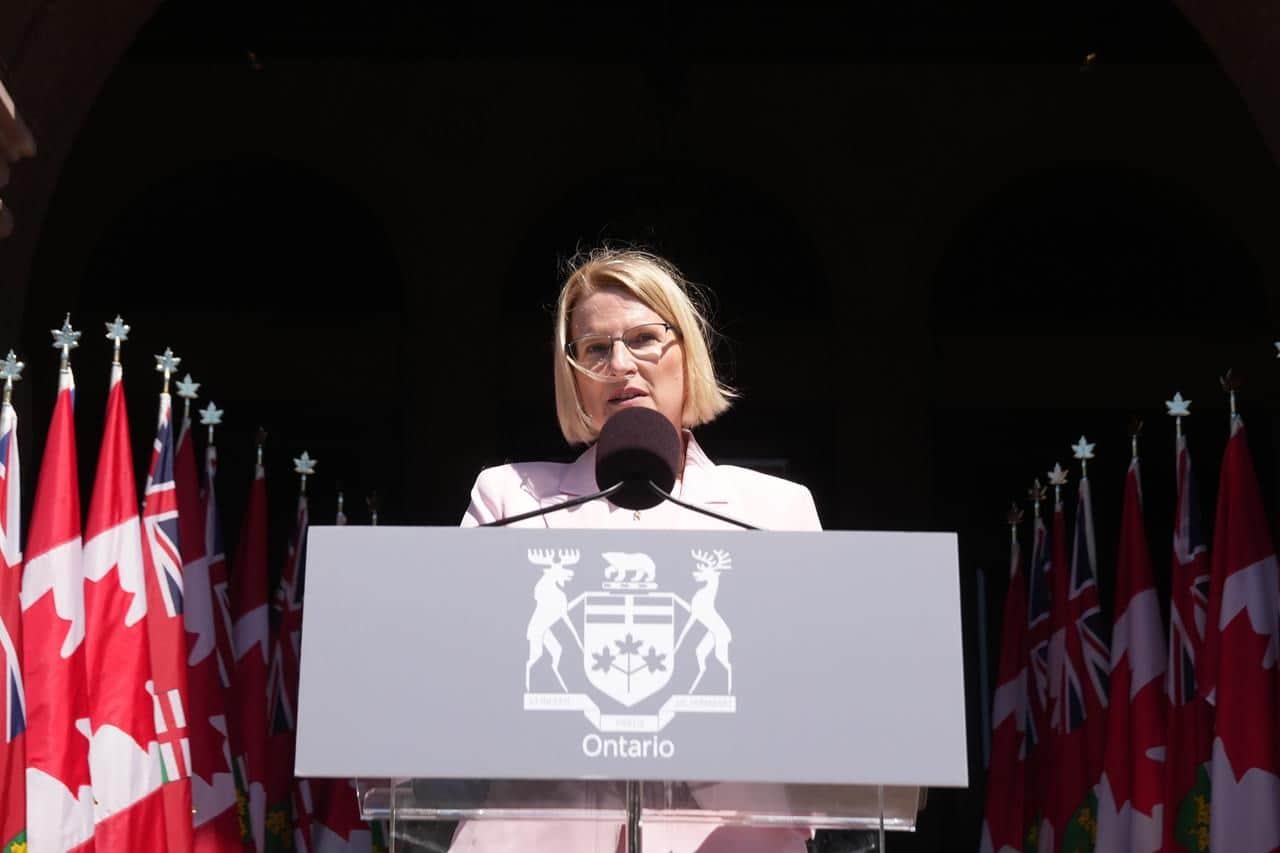Caledon MPP and Health Minister Sylvia Jones breaks long silence on hospital staffing crisis
Published August 2, 2022 at 6:57 pm

Ontario’s new Health Minister Sylvia Jones, under fire for a prolonged silence while an ever-mounting staff shortage closes ER across the province, finally broken that silence today with a rundown of the province’s upcoming strategies for hiring more staff.
Premier Doug Ford appointed Jones to the healthcare portfolio on June 24 when he announced his new cabinet. Following this appointment Jones made several public appearance, including a since-deleted tweet of Ford and Jones golfing, but had not previously addressed the staffing crisis or the closing of hospital units.
I'm not sure what is worse, the complete arrogance of posting a pic like this or the fact that this proves how completely daft @fordnation and @SylviaJonesMPP seem to be on what is really happening in healthcare right now. @ontarionurses @OFLabour @CFNU @CathrynOna pic.twitter.com/mN3572RgE1
— DJ Sanderson, RN, ONA (@4djsanderson) July 31, 2022
In the meantime, numerous hospital clinics, including emergency rooms and intensive care units, shuttered across the province.
After her weeks of quiet, Jones took part in an interview with The Canadian Press on August 2, to share the government’s strategies to deal with the problems facing healthcare.
She told CP the government is examining ways to expedite certification for foreign nurses to come work in Ontario as quickly as possible to fill staffing gaps.
The Ontario Nurses’ Association reported yesterday several hospitals had reduced services over the past few weeks, peaking at 25 such closures over the long weekend.
Bowmanville hospital, about an hour east of Toronto, closed their ICU on July 28, just prior to the Civic Holiday. They sent their patients both 15 minutes west to Oshawa and 30 minutes away to Ajax-Pickering hospital.
The move came as hospital wait-time reach a new peak, unseen in even the worst periods of the COVID-19 pandemic. A report released June 16, found that Oshawa and Ajax-Pickering were already seeing record wait times, at 1.7 and 2 hours respectively before seeing a doctor.
These rises in wait times amid short staff hospitals led numerous patients at Oshawa to describe the ER as “like a warzone.” Despite the pleas from patients in Oshawa, they remain better off than other cities.
The longest waits in the province were at Windsor Regional Hospital with a five hour wait. Two hospitals tied in the runner-up position with Hawkesbury Hospital and Oakville-Trafalgar seeing waits of 3.5 hours.
Hamilton hospitals were roughly comparable to those in Durham Region at around two hour waits. Dr. Kashif Pirzada, an emergency physician in Toronto, credited the rise back in June to the switch to telemedicine over the pandemic, that saw clinics close.
“Many of these patients come to the ER for care instead, for acute and chronic problems. Our emergency care system was never designed for kind of demand and is buckling,” he said.
"Sinking, and sinking fast" were some of the mildest words I could find for the state of Ontario's health care system right now!
But still glad to have the voices of nurses and health-care professionals part of this week-long @tvo series on health care.https://t.co/h87KfBvLuS
— Cathryn ONA, RN (@CathrynOna) July 19, 2022
Things have only worsened since then until they reached the Civic Holiday peak.
The crux of these closures stems mainly from a lack of nursing staff. A StatsCan report from June found 86 per cent of nurses felt increased stress at work, 76 per cent feeling overburdened with work duties and 55 per cent doing work they normally would not.
Over the last two years of the pandemic vacant roles in Ontario hospitals have grown more than 90 per cent. This is expected to greatly worsen over the next three years with nearly a quarter of nurses planning to leave their jobs in that time.
Other roles in the system are also set to see increased strain, though not as badly as nursing, with 16 per cent of PSWs and 11 per cent of doctors looking to quit as well.
Our healthcare is collapsing!
This debacle is mainly attributed to the ON government’s lack of attention & respect towards our public HC!
Nurses are quitting in droves. Hospitals are experiencing an unprecedented staff shortages & guess what:the ON MOH isn’t available to comment! https://t.co/HZ01OcvqI2— Parya Mirjani 🇨🇦 (@paryamirjani) July 29, 2022
Jones said Ontario will continue to do what it has done for four years by continuing to add nurses, adding that the government has hired 10,000 nurses in the last two years. She also shared they will introduce “additional measures” to combat the shortage and mentioned a backlog of workers waiting for certification.
However, an additional hurdle for nurses has been Ford’s controversial Bill 124. Passed just before the pandemic in November 2019, Bill 124 capped healthcare worker wage raises at one per cent per year until 2023.
Opposition parties and the Ontario Nurses Association have long called for the bill’s repeal as an effort to compensate nurses more, encouraging them to remain in the field. However Jones said the repeal remain “a conversation for another day.”
On her lack of comment regarding hospital staffing in recent weeks Jones said she had been meeting organizations and individuals in the in healthcare to hear their solution and feedback.
The Ontario Liberals criticized Jones’ reasoning in a press conference later that day with MPP John Fraser saying, “The message the premier and the minister is sending to the front lines, to patients and their families is we don’t care, it’s not a big deal, you’re on your own.”
With files from Anthony Urciuoli, Karen Longwell and the Canadian Press.
insauga's Editorial Standards and Policies advertising






